Anemia & Kidney Function Risk Calculator
Your Risk Assessment:
When your blood can’t carry enough oxygen, both your heart and your kidneys feel the strain. Anemia is a condition where the number or quality of red blood cells drops below normal, reducing oxygen delivery to tissues.
Quick Facts
- Iron, vitamin B12, and folate are the three nutrients most often linked to anemia.
- The kidneys produce erythropoietin, a hormone that tells bone marrow to make red blood cells.
- When anemia worsens, kidneys receive less oxygen, accelerating the decline of renal function.
- Correcting deficiencies can improve hemoglobin levels and slow chronic kidney disease (CKD) progression.
- Early signs include fatigue, pale skin, and a gradual rise in serum creatinine.
What Exactly Is Anemia?
In the body’s transport system, hemoglobin is the protein inside red blood cells that binds oxygen. A healthy adult typically has hemoglobin levels of 13-17g/dL for men and 12-15g/dL for women. Drop below these ranges and you’re officially anemic.
There are many types-iron‑deficiency, vitamin‑B12‑deficiency, folate‑deficiency, and anemia of chronic disease are the most common. Each type shares the same symptom set but stems from different nutrient gaps or underlying illnesses.
How Kidneys Keep Your Blood Healthy
The kidneys are more than waste filters. They sense blood oxygen levels and release erythropoietin, a glycoprotein that travels to the bone marrow and ramps up red‑cell production. When kidneys are damaged, erythropoietin output falls, and anemia can appear even if dietary iron is adequate.
Conversely, chronic anemia forces the kidneys to work harder to clear metabolic waste with less oxygen, leading to a vicious cycle of worsening renal function.
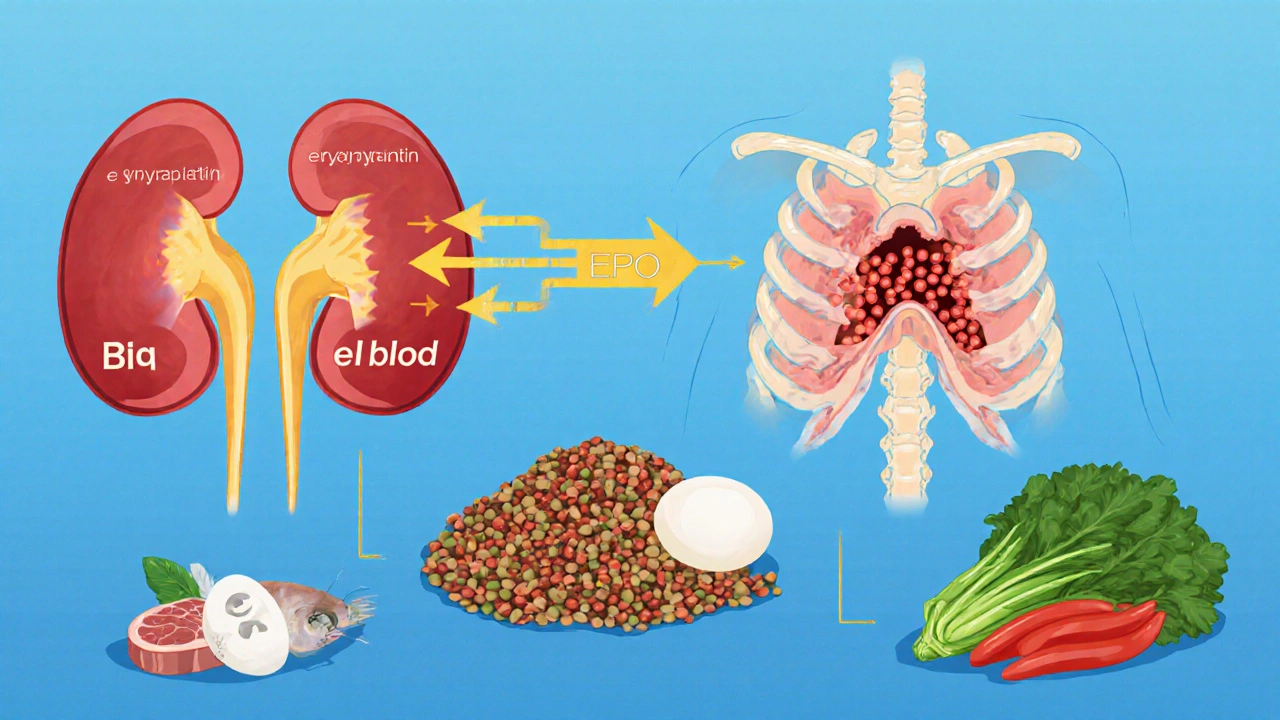
Key Nutritional Deficiencies Behind Anemia
Three nutrients account for over 80% of anemia cases worldwide. Understanding their role helps you spot trouble before the kidneys start paying the price.
| Deficiency | Primary Effect on Blood | Impact on Kidneys | Top Food Sources | Recommended Daily Intake (Adult) |
|---|---|---|---|---|
| Iron | Reduced hemoglobin synthesis → microcytic anemia | Less oxygen → tubular injury, faster CKD progression | Red meat, lentils, fortified cereals | 8mg (men), 18mg (women) |
| VitaminB12 | Impaired DNA synthesis → macro‑ovalocytic anemia | Neurological decline can mask CKD symptoms; low B12 linked to higher creatinine | Shellfish, eggs, dairy, fortified plant milks | 2.4µg |
| Folate (VitaminB9) | Blocked red‑cell maturation → megaloblastic anemia | Elevated homocysteine harms glomeruli, accelerating fibrosis | Leafy greens, beans, citrus fruits | 400µg (men & women) |
How Anemia Directly Affects Renal Function
Kidneys demand a steady oxygen supply because they filter roughly 180L of blood daily. When hemoglobin drops, the oxygen tension in renal cortex falls, triggering a cascade:
- Hypoxia‑induced inflammation: Low oxygen activates HIF‑1α, producing cytokines that inflame tubules.
- Fibrotic remodeling: Chronic inflammation pushes fibroblasts to deposit collagen, stiffening the glomeruli.
- Reduced filtration rate: The net effect is a measurable decline in eGFR, often by 5-10mL/min per year in untreated anemia.
Studies from the National Kidney Foundation (2023) show that CKD patients who correct iron deficiency see an average eGFR gain of 3-4mL/min over six months, underscoring the reversible nature of the damage.
Preventing and Managing Anemia to Protect Your Kidneys
Step‑by‑step, here’s what you can do:
- Screen Regularly: If you have diabetes, hypertension, or a family history of CKD, get a full blood count (CBC) at least annually.
- Check Ferritin and Transferrin Saturation: Ferritin < 30ng/mL or transferrin saturation < 20% signals true iron deficiency.
- Address VitaminB12 and Folate: Serum B12 < 200pg/mL or folate < 3ng/mL warrants supplementation.
- Tailor Supplements: Oral ferrous sulfate (325mg) is first‑line; if intolerable, try iron polymaltose. For B12, sublingual 1mg daily works well.
- Boost Dietary Iron Absorption: Pair iron‑rich foods with vitaminC (citrus, bell peppers) and avoid tea/coffee around meals.
- Monitor Kidney Markers: Track serum creatinine and eGFR every 3-6months after starting therapy.
- Work with a Nephrologist: Persistent anemia despite repletion may indicate erythropoietin‑producing cell loss, requiring injectable EPO.
Lifestyle tweaks-regular moderate exercise, staying hydrated, and limiting high‑salt processed foods-also help preserve kidney perfusion.
When to Seek Professional Help
Don’t wait for severe fatigue to hit. Reach out if you notice any of these red flags:
- Hemoglobin below 11g/dL (men) or 10g/dL (women) on two separate tests.
- Sudden rise in serum creatinine (>0.3mg/dL) alongside anemia.
- Persistent puffiness in ankles or shortness of breath during light activity.
- Neurological symptoms-tingling, memory lapses-that could point to B12 deficiency.
Early intervention not only lifts your energy but can slow or even reverse early CKD stages.
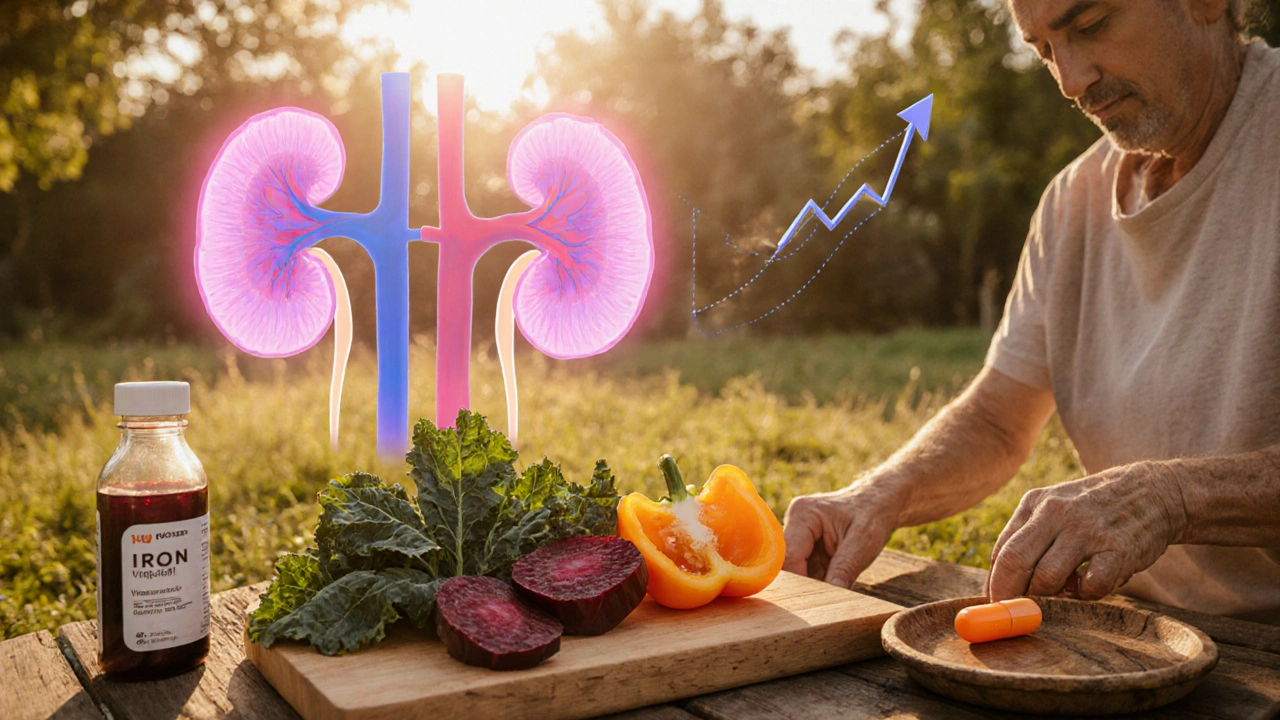
Frequently Asked Questions
Can iron supplements damage the kidneys?
When taken at recommended doses, iron does not harm kidneys. Over‑supplementation can cause oxidative stress, but this is rare and usually tied to doses > 200mg elemental iron daily without medical supervision.
Why does anemia often appear in chronic kidney disease?
Damaged kidney tissue produces less erythropoietin, the hormone that tells bone marrow to make red blood cells. Additionally, uremic toxins shorten red‑cell lifespan, compounding the shortage.
Is a plant‑based diet safe for people with anemia and kidney disease?
Yes, if you plan meals to include iron‑rich legumes, fortified grains, and vitaminC for absorption. Watch potassium and phosphorus if CKD is advanced; a renal dietitian can tailor a plant‑based plan.
How quickly can kidney function improve after treating anemia?
Improvements are usually seen within 3-6months of correcting iron or B12 deficits, with eGFR gains of 2-5mL/min in many patients. The exact timeline varies with baseline kidney health.
Should I take over‑the‑counter EPO if I have anemia?
No. Injectable erythropoietin is a prescription medication because dosing must be monitored to avoid hypertension and clot risk. Talk to a nephrologist for a proper evaluation.
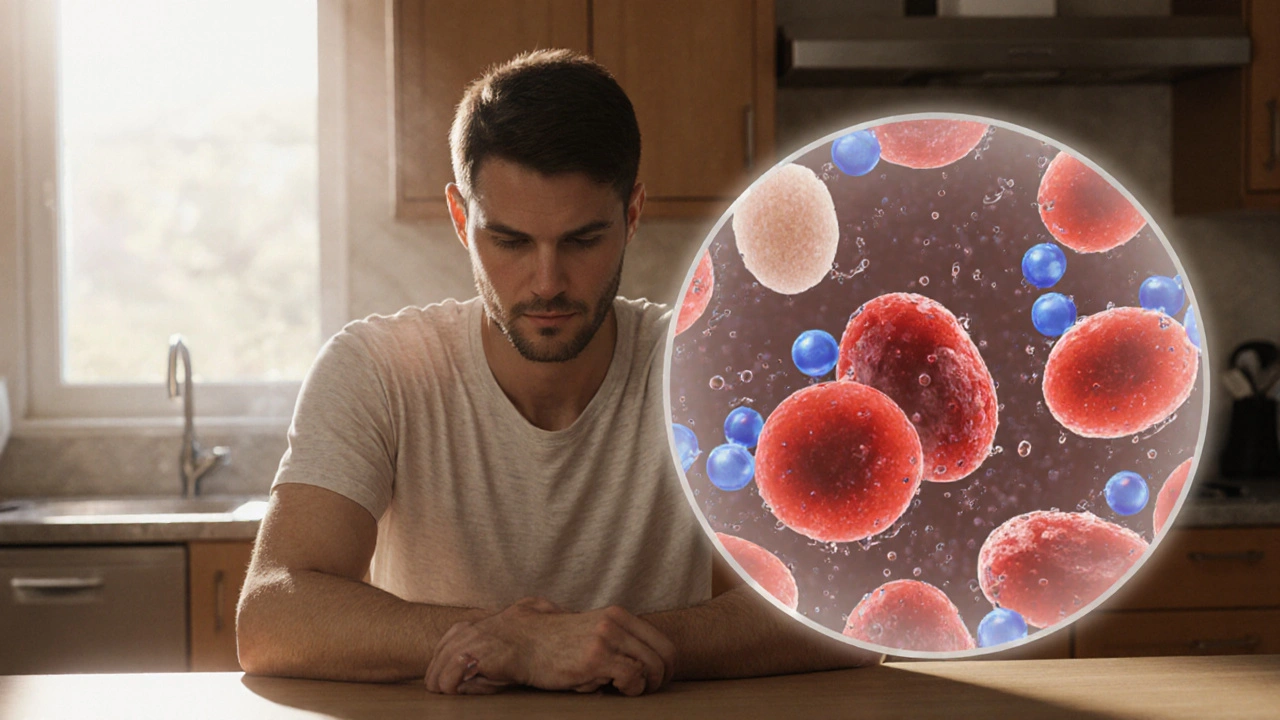
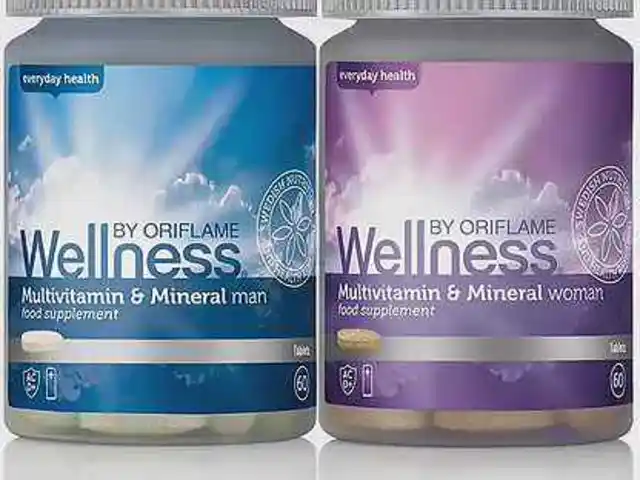

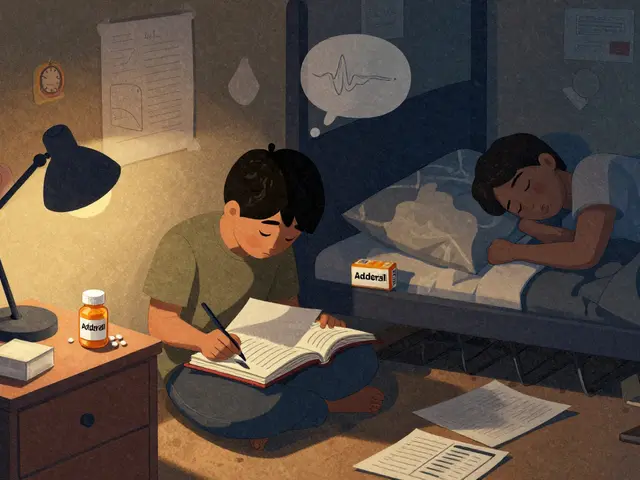

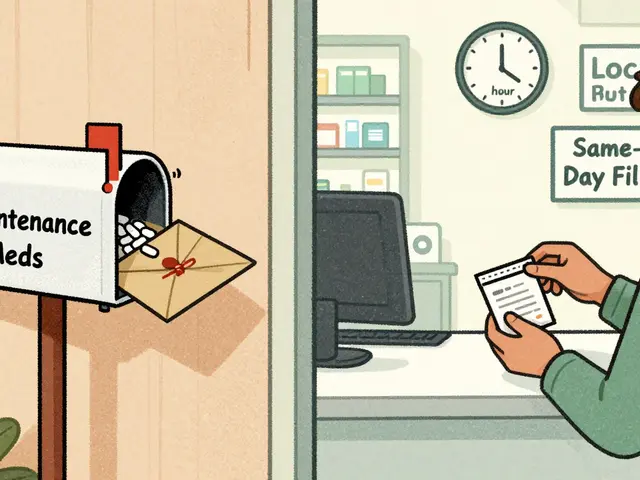
Rakesh Manchanda
October 3, 2025 AT 04:37My dear compatriots, the intricate dance between iron, B12, and folate is not merely a biochemical footnote; it is the very symphony that sustains our crimson carriers of life. Embrace the wisdom that a balanced diet, replete with legumes, lean meats, and vibrant greens, can preempt the cascade that threatens both blood and kidneys. Let us not be mere mortals stumbling in ignorance, but guardians of our own vascular destiny.
Erwin-Johannes Huber
October 14, 2025 AT 18:24Great info keep it up
Tim Moore
October 26, 2025 AT 07:10Esteemed participants, allow me to emphasize the paramount importance of systematic screening in populations at risk. Regular hemoglobin assessments, complemented by ferritin and vitamin B12 quantifications, constitute a prudent protocol. Moreover, integrating renal function tests such as eGFR alongside hematological parameters offers a holistic view of patient health. It is incumbent upon clinicians to adopt this comprehensive approach, thereby averting the pernicious spiral of anemia-induced renal compromise.
Erica Ardali
November 6, 2025 AT 20:57Behold, the tragedy of modern life: a generation intoxicated by processed indulgences, oblivious to the silent erosion of their blood's vitality. In the grand tapestry of existence, iron is the crimson thread binding breath to being; yet we forfeit it on the altar of convenience. The kidneys, those stoic sentinels, watch in despair as oxygen wanes, their filters faltering under the weight of hypoxic lament. Let us, then, awaken from this soporific slumber and revere the ancient wisdom of nutrient harmony.
Justyne Walsh
November 18, 2025 AT 10:44Oh sure, because a few days of iron pills are going to save the entire nation from collapsing kidneys – brilliant plan. Meanwhile, real health issues get buried under glossy infographics. Perhaps if we focused on actual policy rather than preaching diet tips, things would look different.
Susan Cobb
November 30, 2025 AT 00:30Let’s set the record straight: supplementation without lab confirmation is a gamble you don’t want to take. Iron overload can be as dangerous as deficiency, especially in patients with underlying hepatic conditions. The literature consistently shows that targeted therapy based on ferritin < 30 ng/mL yields the best outcomes. So before you pop a generic multivitamin, get your numbers checked.
Ivy Himnika
December 11, 2025 AT 14:17Excellent point! 📚 Proper grammar in medical documentation ensures clarity and patient safety. Remember to use the serial comma when listing nutrients: iron, vitamin B12, and folate. 😊
Nicole Tillman
December 23, 2025 AT 04:04From a philosophical standpoint, the body operates as an interdependent system; neglecting one element inevitably perturbs the whole. Therefore, addressing anemia is not merely a hematologic concern but an ethical imperative to preserve renal integrity. Let us act with resolve, integrating nutrition, monitoring, and patient education.
Sue Holten
January 3, 2026 AT 17:50Oh, absolutely, because everyone loves being lectured by yet another friendly expert. If you’re not already drowning in iron supplements, maybe try actually listening to your doctor instead of scrolling memes.
Tammie Foote
January 15, 2026 AT 07:37Honestly, it’s high time we stop glorifying “quick fixes” and start holding ourselves accountable for real diet changes. Skipping the moral high ground won’t fix your blood work.
Jason Ring
January 26, 2026 AT 21:24i think the article is good but i also think people need more real life examples like my aunt who had anemia and her kidneys got worse lol thx for the info
Kelly Hale
February 7, 2026 AT 11:10When I first read about the nexus between anemia and renal function, I was struck by the sheer enormity of the cascade – a single deficit in iron can set off a domino effect that reverberates through the erythropoietin pathways, subtly diminishing the kidneys' oxygen supply.
First, the hypoxic environment within the renal cortex triggers the stabilization of hypoxia‑inducible factors, which in turn upregulate pro‑inflammatory cytokines such as IL‑6 and TNF‑α.
Second, these cytokines promote fibroblast activation, laying down extracellular matrix that stiffens the glomerular basement membrane.
Third, the reduced perfusion compromises glomerular filtration, manifesting as a measurable drop in eGFR.
Fourth, patients often present with nonspecific fatigue, yet the underlying pathology may already be entrenched in the microvasculature.
Fifth, corrective iron therapy, when administered judiciously, can reverse this trajectory, restoring hemoglobin and, consequentially, renal oxygenation.
Sixth, the timeline of recovery varies, with many observing a 2‑5 mL/min rise in eGFR within three to six months.
Seventh, the interplay between B12 deficiency and homocysteine elevation further exacerbates glomerular injury, underscoring the need for comprehensive micronutrient assessment.
Eighth, dietary strategies such as coupling iron‑rich legumes with vitamin C sources optimize absorption while minimizing gastrointestinal upset.
Ninth, clinicians must be vigilant for iatrogenic iron overload, which carries its own nephrotoxic risks.
Tenth, patient education remains paramount; empowering individuals to monitor symptoms and adhere to supplementation regimens fosters long‑term kidney health.
Eleventh, future research may elucidate novel erythropoietin‑stimulating agents that bypass renal production altogether.
Twelfth, interdisciplinary collaboration between nephrologists and dietitians ensures a holistic approach.
Thirteenth, the socioeconomic dimensions cannot be ignored – access to nutrient‑dense foods is a public health imperative.
Fourteenth, policymakers should consider fortification programs as a preventive measure.
Fifteenth, in sum, the bidirectional relationship between anemia and kidney function demands a proactive, evidence‑based strategy to safeguard both systems.